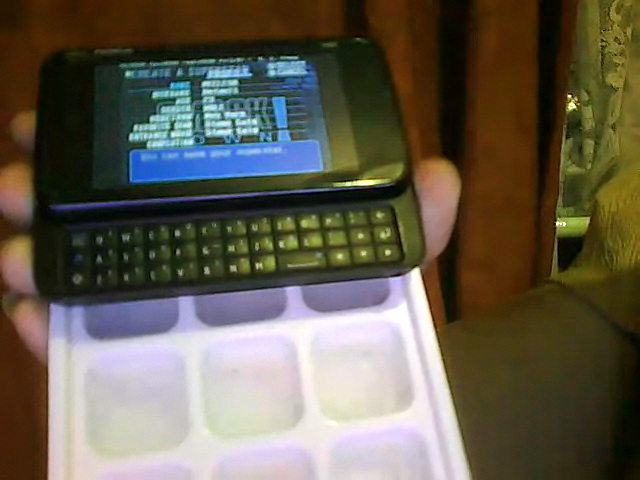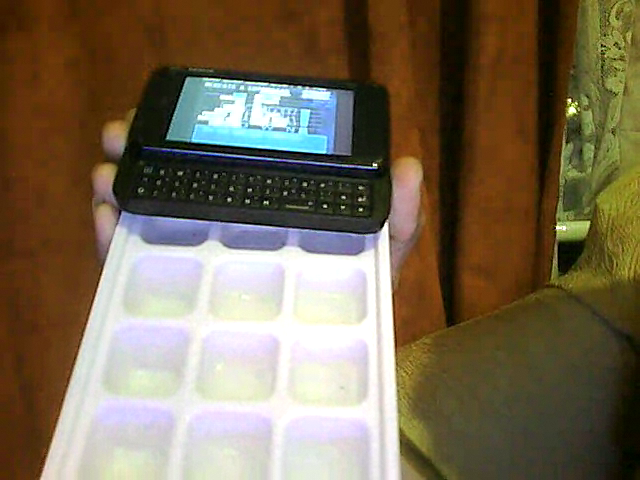| The Following User Says Thank You to dsmflyer For This Useful Post: | ||
|
|
2010-04-06
, 22:51
|
|
|
Posts: 682 |
Thanked: 208 times |
Joined on Jan 2010
@ UK
|
#1422
|
i did dmesg but not sure what i need to look out for, had 900mhz for over 2 days
__________________
n900 (UK) Global 3.2010.02.8
n900 (UK) Global 3.2010.02.8
|
|
2010-04-06
, 22:52
|
|
Posts: 291 |
Thanked: 59 times |
Joined on Mar 2010
@ Manchester, UK
|
#1423
|
ok, i took the plunge
fiasco-image-update /home/user/MyDocs/zImage900.fiasco
all went well!! im at 900mhz now
settings - about remaind perfect
fiasco-image-update /home/user/MyDocs/zImage900.fiasco
all went well!! im at 900mhz now
settings - about remaind perfect
|
|
2010-04-06
, 22:54
|
|
Posts: 17 |
Thanked: 6 times |
Joined on Jan 2010
|
#1424
|
i've been running the 800 - 125 image for a couple of days and its been great, i wanted a little more speed so i flashed to the 900 - 125 and the phone got really scatty, locked up with more than 4 apps running and got really hot.
i've flashed back to the 800 and its all fine.
i'd like to know why some devices can cope with it and others just hate it.
i've flashed back to the 800 and its all fine.
i'd like to know why some devices can cope with it and others just hate it.
| The Following User Says Thank You to skunkonkrunk For This Useful Post: | ||
|
|
2010-04-06
, 22:55
|
|
Posts: 169 |
Thanked: 41 times |
Joined on Apr 2010
@ Portugal
|
#1425
|
Originally Posted by Ronaldo

Dont know what to lookup to in that dmesg command.
i did dmesg but not sure what i need to look out for, had 900mhz for over 2 days
(http://www.linfo.org/dmesg.html)
Running 900 Mhz two days..gaming, browsing, calling, chating..all annormal.. best than normal

Until now...and until ever..i hope.. lol

|
|
2010-04-06
, 22:56
|
|
Posts: 97 |
Thanked: 12 times |
Joined on Feb 2010
|
#1426
|
- any idea how to get settings/about info back? reinstall mp-fremantle-generic-pr didn t work for me...
|
|
2010-04-06
, 22:58
|
|
Posts: 362 |
Thanked: 113 times |
Joined on Feb 2010
|
#1427
|
ideas for cooling?? I think I found a solution :P




|
|
2010-04-06
, 23:02
|
|
Posts: 11 |
Thanked: 5 times |
Joined on Apr 2010
|
#1428
|
Originally Posted by hqh

Somebody knows another way to retrieve these errors (dbus or something... I don't want to parse dbus output each time) ? It can be interesting to write a small script which displays a "popup" when an error like that occurs...

That is correct.
I'm running mine at 750 MHz now. 800 seemed stable at first but after prolonged use caused crashes and apparently corrupted the rootfs. 900 MHz booted but froze almost immediately.
I recommend everyone to check the output of dmesg every now and then. If there are UBIFS (or other filesystem) errors or kernel warnings, you'll have to lower your clock frequency and (in case of filesystem corruption) possibly do a full reflash.
Many users seem to be very enthuasiastic about running at highest possible speed, so I'm expecting more cases of corruption and crashing soon. I can't be the only unlucky one
| The Following User Says Thank You to kangou For This Useful Post: | ||
|
|
2010-04-06
, 23:09
|
|
Posts: 6 |
Thanked: 0 times |
Joined on Apr 2010
|
#1429
|
Lol. Great. Now we need something smaller...
|
|
2010-04-06
, 23:19
|
|
Posts: 97 |
Thanked: 12 times |
Joined on Feb 2010
|
#1430
|
where do I find the dmesg ?
 |
«
Previous Thread
|
Next Thread
»
|
All times are GMT. The time now is 06:34.








I'm glad I'm not the only unlucky one that can't hit the magical 900MHz mark ^^.